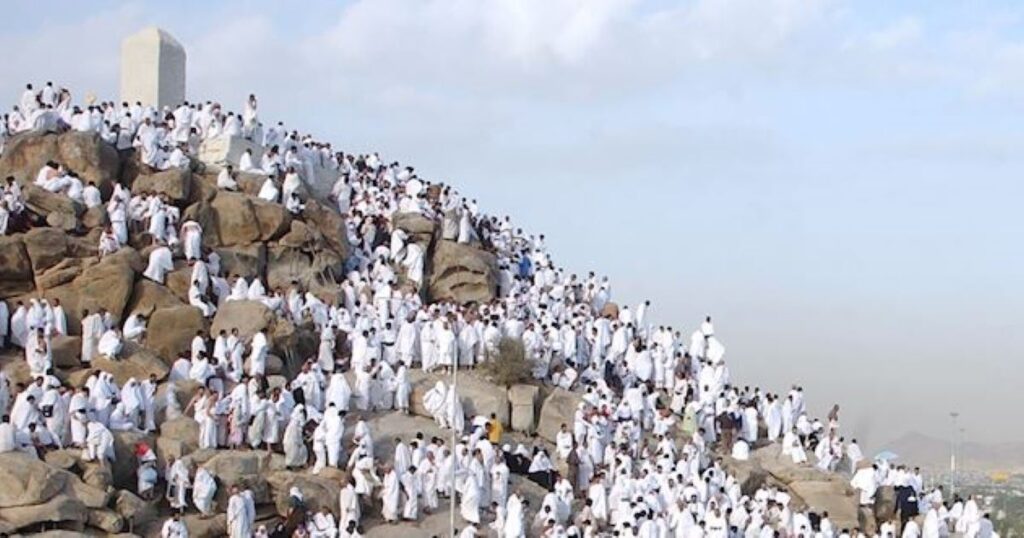Within the Islamic calendar, there lies a day that holds immense spiritual significance for Muslims around the world. Today, we find ourselves immersed in the blessings of the Day of Arafat—a time of deep reflection, repentance, and supplication. On this sacred day, believers seek forgiveness from Allah ﷻ and endeavor to elevate their souls. Join me as we embark on a journey through the virtues of this hallowed day, exploring the wisdom of classical scholars of Ahlul Sunnah Wal Jama’ah, the importance of Takbiraat (Saying God is Greatest), and the profound forgiveness we seek from Allah ﷻ.
“There is no Day on which Allah ﷻ frees more people from the Fire than the Day of Arafat.”
-The Messenger of Allah ﷺ
The Day of Arafat occupies a revered position in Islamic tradition, and its virtues are numerous. The Prophet Muhammad ﷺ (peace be upon him) has stated, as recorded in Sahih Muslim (Book 7, Hadith 1348), “There is no day on which Allah ﷻ frees more people from the Fire than the Day of Arafat.” This profound statement underscores the tremendous opportunity that this auspicious occasion holds for believers to seek forgiveness, redemption, and liberation from the torment of the Hellfire. Moreover, we have another Hadith narrated by Abu Qatadah (may Allah ﷻ be pleased with him) in Sahih Muslim (Book 6, Hadith 2603):”The Messenger of Allah ﷺ (peace be upon him) was asked about fasting on the Day of Arafat. He replied, ‘It expiates the sins of the preceding year and the coming year.'” So, if you can, fast – its of the greatest deeds you could ever perform this day.

The Statements of Our Scholars
Throughout history, esteemed scholars from Ahlul Sunnah Wal Jama’ah have shed light on the significance of the Day of Arafat, guiding believers toward the path of righteousness. Imam Malik ibn Anas, the great jurist, affirmed the sublime nature of this day by stating, as mentioned in Al-Mudawwanah (2/309), “The best of days is the Day of Arafat.” His words echo the sentiment shared by the Prophet Muhammad, emphasizing the exceptional value of this day and urging believers to seize its blessings.
Imam al-Shafi’i, renowned for his wisdom and understanding, spoke of the spiritual significance of the Day of Arafat. In his book Al-Umm (1/481), he stated, “Whoever fasts on the Day of Arafat, his sins for the previous year and the following year will be forgiven.” These profound words highlight what the Messenger of Allah ﷺ told us and exemplify the profound mercy and forgiveness that Allah showers upon His sincere and repentant servants on this momentous day.
The Importance of Takbiraat
As we delve deeper into the virtues of the Day of Arafat, we encounter an integral component of this sacred occasion—Takbiraat. Takbiraat refers to the glorification and praise of Allah through specific words, such as “Allahu Akbar” (Allah ﷻ is the Greatest). The recitation of Takbiraat serves as a powerful means of expressing gratitude, seeking forgiveness, and acknowledging the greatness of Allah.
On the Day of Arafat, Muslims are encouraged to engage in the recitation of Takbiraat abundantly. As they raise their voices in unison, the echoes of “Allahu Akbar” reverberate through the valleys of Arafat, symbolizing their unity, humility, and devotion. The Takbiraat not only magnify the spiritual atmosphere of the day but also serve as a constant reminder of Allah’s greatness and the limitless mercy He bestows upon His creation.
Best of Deeds
Best Deeds to Embrace: On this blessed day, Muslims engage in a multitude of virtuous acts, striving to draw nearer to their Creator ﷻ and seek His forgiveness. One of the foremost deeds recommended is fasting. The Prophet Muhammad himself encouraged fasting on the Day of Arafat, as recorded in Sunan Ibn Majah (Hadith 1731), highlighting its power to expiate sins and elevate one’s spiritual rank.
Apart from fasting, the Day of Arafat is an opportune time for engaging in sincere supplication and heartfelt prayers. Muslims devote their time to engaging in deep conversations with Allah ﷻ , beseeching His forgiveness, mercy, and guidance. This is a day to seek spiritual renewal, to go forth in giving much charity, spreading kindness and mending relationships to shed the burdens of the past, and to embrace the opportunity for a fresh start on the path of righteousness.
Seeking Forgiveness
Seeking Forgiveness from Allah ﷻ : The Day of Arafat serves as a poignant reminder that as fallible beings, we are in constant need of forgiveness. It is a time to reflect on our actions, seek forgiveness for our transgressions, and make a genuine commitment to better ourselves. The gates of repentance are wide open on this day, and sincere repentance is met with divine acceptance and mercy.
The Prophet Muhammad ﷺ (peace be upon him) has stated, as recorded in Sunan Ibn Majah (Hadith 3848), “The greatest supplication is the supplication on the Day of Arafat.” These profound words underscore the immense value of our pleas to Allah on this momentous day. It is a time to turn to Him with humility, to seek His forgiveness, and to strive for a life of righteousness and piety.
The Messenger Ibrahim (Abraham)
Within the tapestry of the Day of Arafat, we find the profound story of the Prophet Ibrahim ﷺ (Abraham) and his unwavering obedience to Allah’s ﷻ command. As narrated in the Quran (Surah As-Saffat, 37:102-107), Ibrahim ﷺ had a dream in which he saw himself sacrificing his beloved son, Ismail ﷺ (Ishmael). Recognizing this as a divine test, Ibrahim ﷺ , with a heavy heart, shared his dream with his son, who displayed unwavering faith and acceptance of Allah’s will.
As Ibrahim ﷺ prepared to carry out the sacrifice, Allah, in His infinite mercy, substituted Ismail ﷺ with a ram, thus exemplifying the ultimate act of submission, trust, and devotion. Allah ﷻ rewarded Ibrahim ﷺ and Ismail ﷺ by making them remembered for the rest of human history – a status worthy of their greatness. This story, known as the “Sacrifice of Ibrahim ﷺ ” or “Eid al-Adha,” holds deep significance within the context of the Day of Arafat.
The story of Ibrahim ﷺ serves as a powerful reminder of the virtue of sacrifice and complete surrender to Allah’s ﷻ commands. It highlights the importance of trust in Allah’s ﷻ wisdom, even in the face of seemingly insurmountable challenges. Ibrahim’s ﷺ unwavering commitment to fulfill Allah’s ﷻ command embodies the spirit of submission that Muslims strive to emulate on the Day of Arafat and throughout the rest of our lives.
In Summary
As the sun sets on this hallowed day, we are reminded of the virtues that envelop the Day of Arafat. Through fasting, supplication, and the recitation of Takbiraat, we have the opportunity to cleanse our souls, rejuvenate our connection with Allah, and seek His boundless mercy and forgiveness. May we find Allah ﷻ pleased with us as we put forth our best deeds, and may we have a deep understanding of the wisdom that illuminates the importance of this day, urging us to seize the chance for spiritual growth, redemption, and liberation from the consequences of our past sins.
In the spirit of earnest devotion, let us embrace this sacred day with open hearts, uplifted souls, and a sincere desire to seek Allah’s ﷻ pleasure. Today, as the Day of Arafat unfurls its wings, let us immerse ourselves in the magnificence of this occasion, drawing closer to our Creator and embarking on a journey of virtue, Takbiraat, the profound forgiveness we seek from Allah ﷻ , and the reflection upon the timeless story of Ibrahim ﷺ —a story of sacrifice, submission, and unwavering faith.




